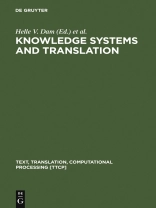It is generally agreed that knowledge plays an important role in translation and interpreting and that it should therefore be of central concern to translation and interpreting studies. However, there is no general agreement about what is actually meant by the term ‘knowledge’ in this context, nor about in exactly what ways it is relevant. Also, present-day translation and interpreting studies offer only a limited amount of research specifically dedicated to knowledge systematization and other knowledge-related issues.
This book is one of the first to systematically and exclusively address the question of knowledge in translation and interpreting. It is a collection of papers by leading scholars both from the field of translation and interpreting and from adjacent fields where knowledge also plays an important role, such as linguistics and computer science. The experts present a wide variety of conceptions of knowledge and a number of different approaches to the study of knowledge in translation and interpreting: some of them draw on concepts such as scenes and frames, mental spaces and semantic networks, some discuss knowledge systems from an ontological point of view, and some present more general concepts of knowledge in translation and interpreting. Along the same lines, some of the contributors deal mainly with theoretical and conceptual aspects, others focus on methodological issues, and again others report on empirical studies. What brings them together, however, is their common focus on the interface between knowledge and translation/interpreting, and their main achievement is that, by joining forces, they manage to present to their readers a state-of-the-art report which offers both a clearer delimitation of the concept of knowledge and a better understanding of its role in translation and interpreting.
Table des matières
Helle V. Dam and Jan Engberg : Introduction
Section 1: Theory and concepts
Andrew Chesterman: The memetics of knowledge
Torben Thrane: Representing interpreters’ knowledge: Why, what, and how?
Walther von Hahn: Knowledge representation in machine translation
Annely Rothkegel: Knowledge and text types
Gerhard Budin: Ontology-driven translation management
Klaus Schubert: Translation studies: Broaden or deepen the perspective?
Section 2: Methodology
Daniel Gile: Empirical research into the role of knowledge in interpreting: methodological aspects
Arnt Lykke Jakobsen: Investigating expert translators’ processing knowledge
Section 3: Empirical studies
Mary Snell-Hornby: Of catfish and blue bananas: scenes-and-frames semantics as a contrastive ‘knowledge system’ for translation
Laura Sergo and Gisela Thome: Translation-related analysis of the textualisation of a knowledge system on the basis of Fauconnier’s concept of mental spaces
Helle V. Dam, Jan Engberg, and Anne Schjoldager: Modelling semantic networks on source and target texts in consecutive interpreting: a contribution to the study of interpreters’ notes
Young-Jin Kim: Cultural constellations in text and translation
Robin Setton: Pointing to contexts: a relevance-theoretic approach to assessing quality and difficulty in interpreting
A propos de l’auteur
Helle V. Dam is Assistant Professor at the Aarhus School of Business, Denmark.
Jan Engberg is Professor at the Aarhus School of Business, Denmark.
Heidrun Gerzymisch-Arbogast is Professor at the University of the Saarland, Saarbrücken, Germany.












